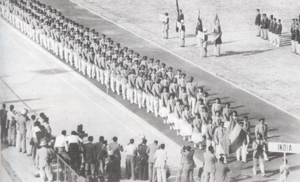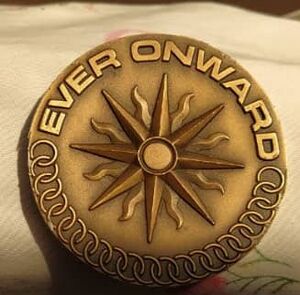Asian Games facts for kids
Quick facts for kids Asian Games |
|
|---|---|
 |
| Abbreviation | Asiad |
|---|---|
| Motto | Ever Onward |
| First event | 1951 Asian Games, New Delhi, India |
| Occur every | Four years |
| Last event | 2022 Asian Games, Hangzhou, China |
| Next event | 2026 Asian Games, Aichi Prefecture and Nagoya, Japan |
| Purpose | Multi-sport event for nations in Asia |
| Headquarters | Kuwait City, Kuwait |
| President | Raja Randhir Singh |
The Asian Games, also known as Asiad, is a major sports competition for athletes from all over Asia. It happens every four years and features many different sports, similar to the Olympic Games. In fact, it's the second-largest multi-sport event in the world, right after the Olympics.
The first Asian Games were held in New Delhi, India, in 1951. At first, they were managed by the Asian Games Federation. But since 1982, the Olympic Council of Asia (OCA) has been in charge. The International Olympic Committee officially recognizes the Games.
So far, nine different nations have hosted the Asian Games. A total of 46 nations have sent their athletes to compete. The most recent Games took place in Hangzhou, China, in 2023. The next ones are set for Aichi Prefecture and Nagoya in Japan, in 2026.
After the main Asian Games, the host city often holds the Asian Para Games. This event is for athletes with disabilities, just like the Paralympic Games.
Contents
How the Asian Games Began
Early Games in Asia
Before the Asian Games, there was another event called the Far Eastern Championship Games. It started in 1913 and brought together Japan, the Philippines, and China. These games were held ten times until 1934.
However, disagreements between China and Japan led to the games being canceled in 1938. After that, the event was stopped for good.
Creating the Asian Games
After World War II, many countries in Asia became independent. They wanted a way to show their strengths and build friendships through peaceful competition. During the 1948 Summer Olympics in London, officials from China and the Philippines talked about bringing back a sports event for Asia.
Guru Dutt Sondhi, a representative from India on the International Olympic Committee, suggested a brand-new competition. He believed it would show the unity and talent of Asian athletes. This idea led to the creation of the Asian Games. In 1949, the Asian Games Federation was formed, and New Delhi was chosen to host the very first Games in 1951.
Tough Times for the Games
The Games have faced some challenges over the years. In 1962, the host country, Indonesia, had political disagreements with Israel and Taiwan and did not allow them to compete. This caused problems with the International Olympic Committee (IOC).
In 1970, South Korea was supposed to host the Games but had to back out because of money and security issues. Thailand stepped in to host the event in Bangkok instead. The 1974 Games in Tehran, Iran, were important because China, North Korea, and Mongolia participated for the first time.
More problems arose before the 1978 Games. Pakistan, the original host, couldn't hold the event due to financial and political troubles. Thailand once again came to the rescue and hosted the Games in Bangkok.
Growing and Changing
Because of these challenges, the National Olympic Committees in Asia decided to make a change. In 1981, they created the Olympic Council of Asia (OCA) to organize the Games. The OCA has been in charge since the 1986 Games in Seoul, South Korea.
In 1990, the Games were held in Beijing, China. Taiwan was allowed to compete again, using the name Chinese Taipei. The 1994 Games in Hiroshima, Japan, welcomed five new countries from Central Asia: Kazakhstan, Kyrgyzstan, Tajikistan, Turkmenistan, and Uzbekistan. This was also the first time the Games were held in a city that wasn't a country's capital.
Symbols and Traditions
The Motto and Logo
The Asian Games motto is "Ever Onward." It was suggested by Guru Dutt Sondhi in 1949 and represents the idea of always moving forward and improving.
The logo is a large red sun with 16 rays and a white circle in the center. It symbolizes the bright and warm spirit of the people of Asia.
Meet the Mascots
Since the 1982 Games in New Delhi, every Asian Games has had a mascot. A mascot is usually an animal found in the host country or a character that represents its culture. Mascots help make the Games fun and friendly for everyone.
Who Competes in the Games?
All 45 member nations of the Olympic Council of Asia (OCA) can send athletes to the Asian Games.
Some countries, like Turkey and Russia, are partly in Asia but compete in the European Games. Israel used to compete in the Asian Games but now participates in the European Games.
Taiwan competes under the name Chinese Taipei due to its unique political situation. Macau is also allowed to compete, even though it is not a member of the International Olympic Committee.
Only seven countries have competed in every single Asian Games since the beginning: India, Indonesia, Japan, the Philippines, Sri Lanka, Singapore, and Thailand.
Host Cities Through the Years
| Edition | Year | Host | Games dates / Opened by |
Countries | Competitors | Sports | Events | Top-ranked team | Ref. |
|---|---|---|---|---|---|---|---|---|---|
| 1 | 1951 | 4–11 March 1951 President Rajendra Prasad |
11 | 489 | 6 | 57 | |||
| 2 | 1954 | 1–9 May 1954 President Ramon Magsaysay |
18 | 970 | 8 | 76 | |||
| 3 | 1958 | 24 May – 1 June 1958 Emperor Hirohito |
16 | 1,820 | 13 | 97 | |||
| 4 | 1962 | 24 August – 4 September 1962 President Sukarno |
12 | 1,460 | 13 | 88 | |||
| 5 | 1966 | 9–20 December 1966 King Bhumibol Adulyadej |
16 | 1,945 | 14 | 143 | |||
| 6 | 1970 | 9–20 December 1970 King Bhumibol Adulyadej |
18 | 2,400 | 13 | 135 | |||
| 7 | 1974 | 1–16 September 1974 Shah Mohammad Reza Pahlavi |
19 | 3,010 | 16 | 202 | |||
| 8 | 1978 | 9–20 December 1978 King Bhumibol Adulyadej |
3,842 | 19 | 201 | ||||
| 9 | 1982 | 19 November – 4 December 1982 President Zail Singh |
23 | 3,411 | 21 | 147 | |||
| 10 | 1986 | 20 September – 2 October 1986 President Chun Doo-hwan |
22 | 4,839 | 25 | 270 | |||
| 11 | 1990 | 22 September – 7 October 1990 President Yang Shangkun |
31 | 6,122 | 27 | 310 | |||
| 12 | 1994 | 2–16 October 1994 Emperor Akihito |
42 | 6,828 | 34 | 338 | |||
| 13 | 1998 | 6–20 December 1998 King Bhumibol Adulyadej |
41 | 6,554 | 36 | 377 | |||
| 14 | 2002 | 29 September – 14 October 2002 President Kim Dae-jung |
44 | 7,711 | 38 | 419 | |||
| 15 | 2006 | 1–15 December 2006 Emir Hamad bin Khalifa Al Thani |
45 | 9,520 | 39 | 424 | |||
| 16 | 2010 | 12–27 November 2010 Premier Wen Jiabao |
9,704 | 42 | 476 | ||||
| 17 | 2014 | 19 September – 4 October 2014 President Park Geun-hye |
9,501 | 37 | 439 | ||||
| 18 | 2018 | 18 August – 2 September 2018 President Joko Widodo |
11,300 | 46 | 465 | ||||
| 19 | 2022 | 23 September – 8 October 2023 President Xi Jinping |
11,935 | 40 | 481 | ||||
| 20 | 2026 | 19 September – 4 October 2026 Emperor Naruhito (expected) |
Future event | 41 | 460 | Future event | |||
| 21 | 2030 | 4 – 19 November 2030 | Future event | ||||||
| 22 | 2034 | 29 November – 14 December 2034 | Future event | ||||||
What Sports Are Played?
The number of sports at the Asian Games has grown over time. The 2022 Games in Hangzhou had the most events ever, with 481 finals in 40 different sports.
To keep the Games from getting too big, the OCA now limits the number of sports. The program usually includes sports from the Summer Olympic Games, plus a few regional sports that are popular in Asia. Some of the sports you can see at the Games include:
- Aquatics (like swimming and diving)
- Archery
- Athletics (track and field)
- Badminton
- Baseball
- Basketball
- Boxing
- Canoeing
- Cricket
- Cycling
- Equestrian (horse riding)
- Esports (video games)
- Fencing
- Field hockey
- Football (soccer)
- Golf
- Gymnastics
- Judo
- Karate
- Rugby
- Sailing
- Shooting
- Table tennis
- Taekwondo
- Tennis
- Volleyball
- Weightlifting
- Wrestling
- Wushu (a Chinese martial art)
Top Medal-Winning Countries
Out of the 46 nations that have competed, 43 have won at least one medal. Only Bhutan, Maldives, and Timor-Leste are still seeking their first medal.
China and Japan are the only two countries that have finished at the top of the medal table. China has been the top country at every Games since 1982. At the 2022 Games, India became the fourth nation ever to win more than 100 medals in a single edition, after Japan, China, and South Korea.
| Rank | Nation | Gold | Silver | Bronze | Total |
|---|---|---|---|---|---|
| 1 | 1,674 | 1,105 | 791 | 3,570 | |
| 2 | 1,084 | 1,104 | 1,054 | 3,242 | |
| 3 | 787 | 722 | 916 | 2,425 | |
| 4 | 192 | 202 | 217 | 611 | |
| 5 | 183 | 239 | 357 | 779 | |
| 6 | 165 | 180 | 292 | 637 | |
| 7 | 144 | 189 | 311 | 644 | |
| 8 | 121 | 161 | 188 | 470 | |
| 9 | 118 | 164 | 304 | 586 | |
| 10 | 105 | 138 | 171 | 414 | |
| Totals (10 entries) | 4,573 | 4,204 | 4,601 | 13,378 | |
Most Valuable Players
The Most Valuable Player (MVP) award is given to the best athlete of the Games. It was first introduced in 1998. Since 2022, one male and one female athlete receive the award.
| Year | Athlete | Sport | Ref | |
|---|---|---|---|---|
| Male | Female | |||
| 1998 | N/A | Athletics | ||
| 2002 | N/A | Swimming | ||
| 2006 | N/A | Swimming | ||
| 2010 | N/A | Badminton | ||
| 2014 | N/A | Swimming | ||
| 2018 | N/A | Swimming | ||
| 2022 | Swimming | |||
See also
 In Spanish: Juegos Asiáticos para niños
In Spanish: Juegos Asiáticos para niños
- Asian Beach Games
- Asian Winter Games
- Asian Indoor and Martial Arts Games
- Asian Youth Games
- South Asian Games
- Southeast Asian Games
- West Asian Games
 | Selma Burke |
 | Pauline Powell Burns |
 | Frederick J. Brown |
 | Robert Blackburn |



